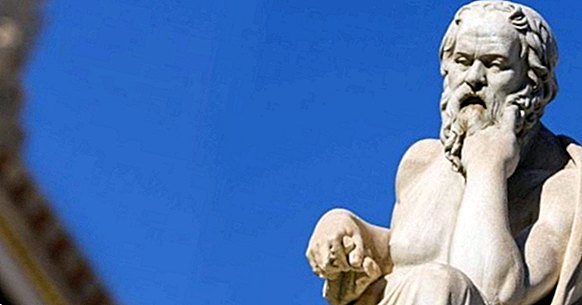The epistemological theory of Socrates
Socrates is perhaps the first moral philosopher in the history of Europe. In his system of ideas, knowledge and wisdom are elements linked to the good, while ignorance is evil (belief that also adopted his disciple, Plato.
In this article we will see what was the epistemological theory of Socrates and in what way was it linked to morality. But first let's start by briefly review the life of this Greek philosopher to better understand why he thought as he did.
- Related article: "70 phrases of Socrates to understand his thought"
Who was Socrates?
Socrates was born in the city-state of Athens in the year 469 a. C . It is known that he participated in the Peloponnesian War against other Greek cities, among which Sparta stood out, and that on his return he dedicated himself to Athenian politics. In this way he had the opportunity to get used to discussing and developing complex ideas through dialogue, something that would later serve to develop his philosophical inquiries.
Years later, when his father died, he inherited a quantity of money that allowed him to live without the need to work in a remunerated way. This fact was what made it possible for Socrates to become a philosopher.
Quickly, Socrates began to gain visibility as a public figure on the streets of Athens. This thinker challenged people to defend their most fundamental beliefs to their ultimate consequences , and from the posing of questions that the other had to answer showed that these ideas were not as well grounded as they seemed at first. This made him win followers, students who attended their conversations.
The influence that Socrates was winning made the authorities suspicious of him, and finally they accused him of corrupting the youth, for which he was condemned to death. Socrates ended up committing suicide by drinking hemlock in the year 399 a. C.
- Maybe you're interested: "How are Psychology and Philosophy alike?"
The epistemological theory of Socrates
These are the main aspects of the epistemological theory of Socrates. Not only was it one of the first attempts to create a philosophical system of epistemology in the West, but also it served as a starting point for thinkers as important as Plato .
1. The need to know what is good
The main objective of human existence, which gives meaning to life, is live following the path of good . By definition, the good is a vector that tells us what actions are desirable and which are not.
2. Good is an absolute concept
Both good and evil are concepts that exist independently of us. Think of them or not, whether we exist or not, good and evil are there , and they say something about who we are even if we are not aware of it.
3. Philosophical inquiry is necessary
As a consequence of the above, it is necessary to investigate through philosophy to go beyond the simple idea that good exists and to know exactly what its form is. As to act in the right way, it is necessary to know reality, Socrates establishes an equivalence between good and wisdom .
4. The rejection of preconceived ideas
To get to the idea of good, we have to question everything we think we know to see if it really is based on true ideas. For this, Socrates resorted to a knowledge principle called maieutics .
What is maieutics according to Socrates?
Socrates believed that, although many of our beliefs are false, through their questioning we can get closer to the truth.
The maieutics is a form of dialogue in which each statement is replicated with a question that forces the issuer to develop more their ideas. In this way it can be checked if it has no vulnerable flanks or if it really is a simple intuition, an easily falsifiable belief.
As Socrates defended the value of maieutics, He showed no enthusiasm for long speeches or for the possibility of writing books , but preferred dialogue developed in real time as a tool to create knowledge. This idea was taken up by other intellectuals later on, although his disciple Plato, despite sharing many ideas with him, did not follow his teacher in that regard (and in fact was responsible for leaving in writing the ideas of Socrates, since the latter did not).
What does "I just know I do not know" mean?
For Socrates, this declaration of intentions was a way of expressing the importance of basing knowledge on the questioning of everything that seems obvious. Challenge ideas It may seem simply a way of undermining theories, but it can also be seen as the opposite: a way to strengthen them and make them really correspond to reality through constructive criticism.



















